Introduction to the Chausie breed
The Chausie breed is a captivating and charismatic hybrid cat that has gained popularity in recent years. This unique breed is a result of crossing domestic cats with the jungle-feline Chaus, also known as Jungle Cat. The Chausie's striking appearance, reminiscent of its wild ancestors, makes it a fascinating companion for those who appreciate the allure of the exotic.
Chausies are known for their remarkable physical features, which include a muscular body, large ears, and expressive eyes. Their coat can vary in color and pattern, ranging from solid black to various shades of brown and silver. Their short coat is low-maintenance and requires minimal grooming.
In addition to their stunning looks, Chausies possess an intelligent and adventurous temperament. They are highly active and require plenty of mental stimulation through play and interactive toys. These cats love to explore their surroundings and may exhibit a strong hunting instinct.
While Chausies make wonderful companions, it's important to note that they require dedicated care and attention due to their energetic nature. Regular exercise, such as play sessions or access to an outdoor enclosure, is essential for them to burn off excess energy.
Overall, the Chausie breed appeals to feline enthusiasts looking for a distinctive feline companion with the charm of the wild. With proper care and attention, they can bring joy and excitement into any household that appreciates their unique attributes.
History and origins of the Chausie

The Chausie breed is a fascinating hybrid cat that has its origins in the interbreeding of domestic cats and the Jungle Cat, also known as the Chaus. The history of the Chausie can be traced back to ancient Egypt, where depictions of cats resembling the Chausie have been found in artwork and hieroglyphics.
The breeding programs to develop the Chausie as a recognized breed began in the 1960s and gained momentum in the 1990s. Dedicated breeders aimed to create a domesticated cat with strong physical resemblances to its wild ancestors while maintaining a friendly and sociable temperament.
The Jungle Cat, or Felis chaus, is native to parts of Asia and the Middle East. It is known for its large size, muscular build, and distinctive ticked coat pattern. By selectively breeding domestic cats with Jungle Cats, breeders hoped to capture some of these striking physical traits while producing a cat that would be suitable for life in a household environment.
Over time, advances in genetic testing have enabled breeders to refine their breeding programs further. Today's Chausies are often several generations removed from their wild ancestors but still retain certain physical characteristics that set them apart from other domestic cats.
Through careful selection and breeding practices, the Chausie has emerged as an individualistic breed with unique qualities that appeal to those seeking an exotic-looking companion. Their history and origins make them a captivating choice for cat lovers who appreciate their connection to ancient feline heritage.
The physical characteristics of a Chausie
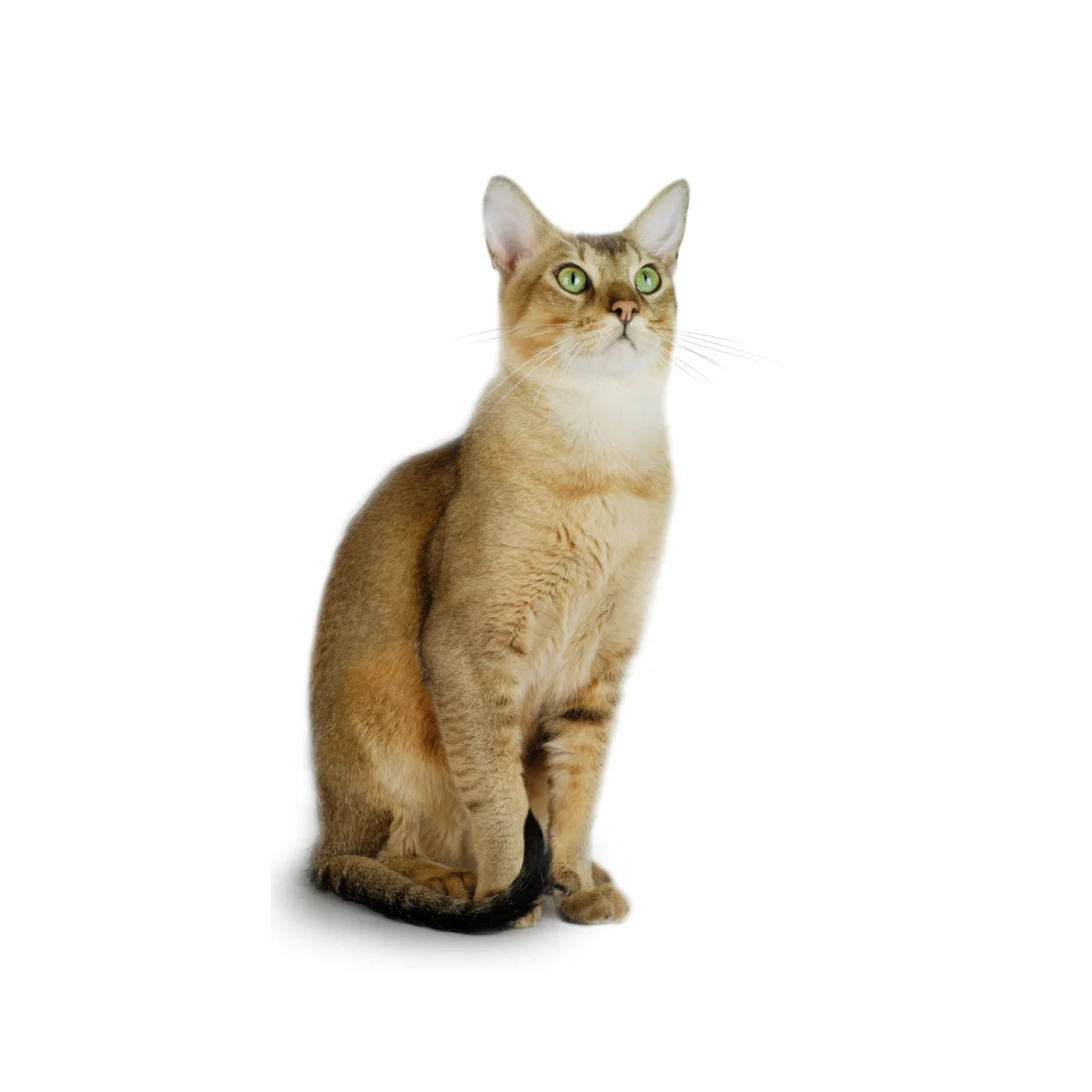
The physical characteristics of a Chausie set them apart from other domestic cat breeds. These hybrid cats have a distinct appearance that reflects their wild ancestry.
One notable feature of the Chausie is their size. They are larger than most domestic cats, with males weighing between 15 to 25 pounds and females slightly smaller at 10 to 15 pounds. Their muscular build gives them a strong and athletic physique.
The coat of a Chausie is another unique trait. Their short, dense fur comes in various colors and patterns, including solid black, brown ticked tabby, silver ticked tabby, and black smoke. The ticked pattern resembles that of the Jungle Cat, with each hair banded in multiple colors.
Chausies also have elongated legs and large, tufted ears that contribute to their distinctive appearance. Their eyes are typically almond-shaped and can be gold or green in color.
Another striking physical characteristic of the Chausie is their long, tapering tail. It adds to their agile and graceful presence.
Overall, the physical characteristics of a Chausie combine elegance with athleticism, creating a visually captivating breed that stands out among other domestic cats.
Temperament and personality traits of a Chausie
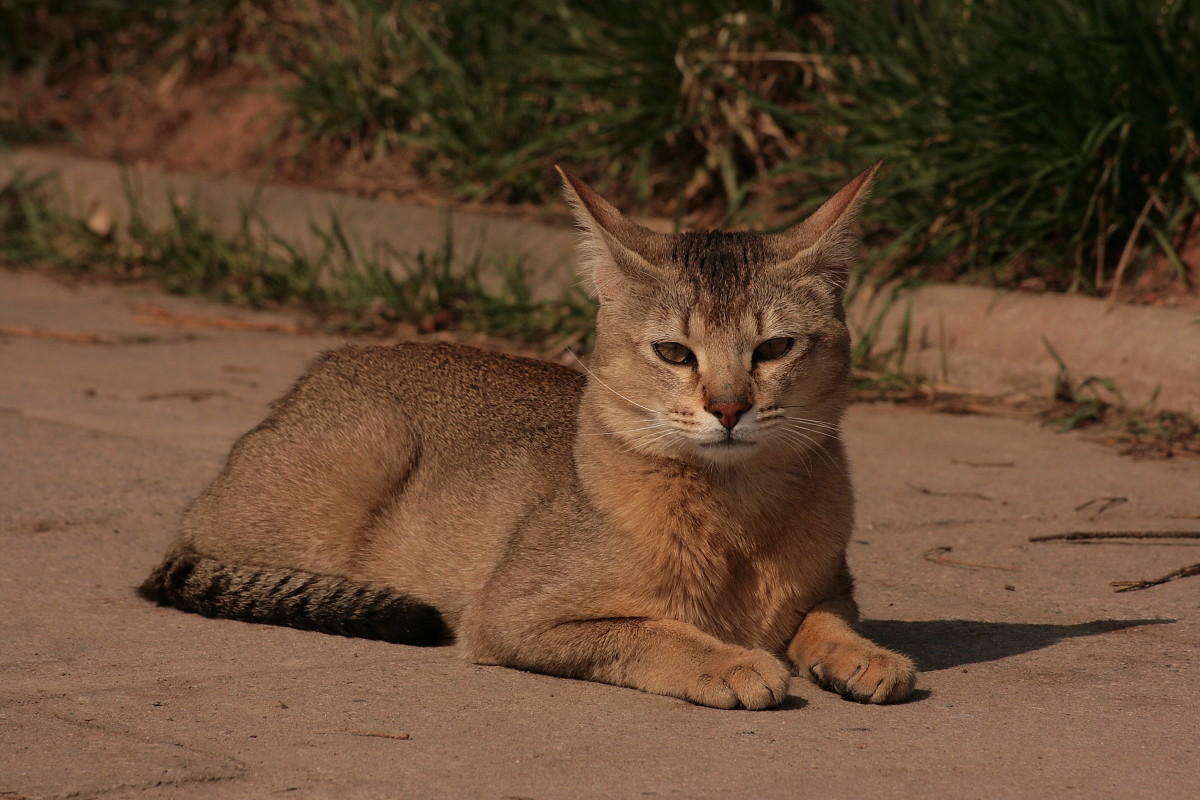
The Chausie breed is known for its unique temperament and distinct personality traits. Being a hybrid cat with wild ancestry, Chausies may exhibit certain characteristics that set them apart from other domesticated cats.
Chausies are highly intelligent and curious cats. They have an innate sense of adventure and love exploring their surroundings. Their active and playful nature makes them excellent hunters as well. It's important to provide ample mental and physical stimulation for Chausies to keep them happy and engaged.
While they are energetic, Chausies also enjoy spending quality time with their human companions. They often form strong bonds with their owners and crave attention and affection. Many Chausies are known to be loyal and devoted pets, often following their owners around the house or perching close by to observe their activities.
Chausies can be assertive and independent at times, displaying a strong sense of individuality. They may not always appreciate being treated like lap cats but still enjoy being in the presence of their loved ones. Some Chausies can be aloof with strangers, taking time to warm up to new people or animals in their environment.
Additionally, Chausies have been described as vocal cats, often engaging in conversations with their owners through chirps, trills, and even chattering noises. This is thought to be a remnant of their wild heritage as these vocalizations were once used in the wild for communication.
Overall, the temperament and personality of a Chausie make them a fascinating companion for individuals or families who appreciate an active yet affectionate feline companion that will keep them entertained with their unique behaviors and charming character traits.
Health considerations for Chausies
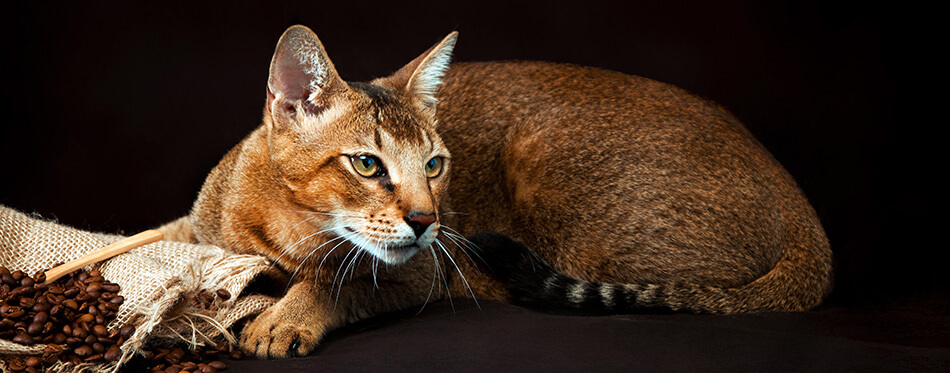
Chausies are generally a healthy breed, but there are some health considerations to keep in mind. First and foremost, it is important to provide regular veterinary care for your Chausie to ensure their overall health and well-being.
One potential health concern for Chausies is hypertrophic cardiomyopathy (HCM), which is a genetic heart condition that can affect cats of any breed. Regular cardiac screenings by a veterinarian are recommended to detect and manage this condition if present.
Chausies may also be prone to dental issues, such as periodontal disease. It is essential to maintain proper dental hygiene by regularly brushing your cat's teeth and providing dental treats or toys.
As with most hybrid breeds, Chausies have a higher metabolism than average domestic cats. It is crucial to monitor their diet and weight to avoid obesity-related health problems. Feeding them a balanced diet specifically formulated for active cats will help keep them at a healthy weight.
Additionally, Chausies have an instinctive urge to explore and climb. Ensure their environment is safe by removing any hazards that they could potentially injure themselves on or swallow.
Lastly, like all cats, Chausies should be kept up-to-date on vaccinations and protected against parasites such as fleas, ticks, and worms.
By providing regular veterinary care, maintaining good dental hygiene, monitoring their weight, keeping a safe environment, and staying on top of vaccinations and parasite prevention, you can help ensure the overall health and longevity of your Chausie companion.
Caring for a Chausie: Diet, exercise, and grooming

To ensure the overall health and well-being of a Chausie, it is essential to provide a proper diet, regular exercise, and consistent grooming.
When it comes to diet, Chausies have a higher metabolism than average domestic cats due to their wild ancestors. It is crucial to feed them a balanced diet specifically formulated for active cats. High-quality cat food that contains a good balance of protein and nutrients will help keep them in optimal condition. Consult with your veterinarian for specific dietary recommendations.
In terms of exercise, Chausies are known for their high energy levels and love for physical activities. Provide ample opportunities for playtime and engagement by offering toys that encourage hunting and climbing. Interactive play sessions involving chasing toys or feather wands can help satisfy their need for mental stimulation as well.
Grooming is also important to keep your Chausie looking its best. Their short coat requires minimal grooming, but regular brushing will help remove loose hairs and prevent matting. Additionally, routine nail trims, ear cleaning, and dental care should be part of their grooming routine.
Remember to check their ears regularly for any signs of infection or debris buildup. Brushing their teeth regularly helps prevent dental issues like periodontal disease.
By providing a nutritious diet, engaging in regular exercise sessions, and maintaining proper grooming practices, you can contribute to the overall health and happiness of your Chausie companion.
Training and socializing a Chausie
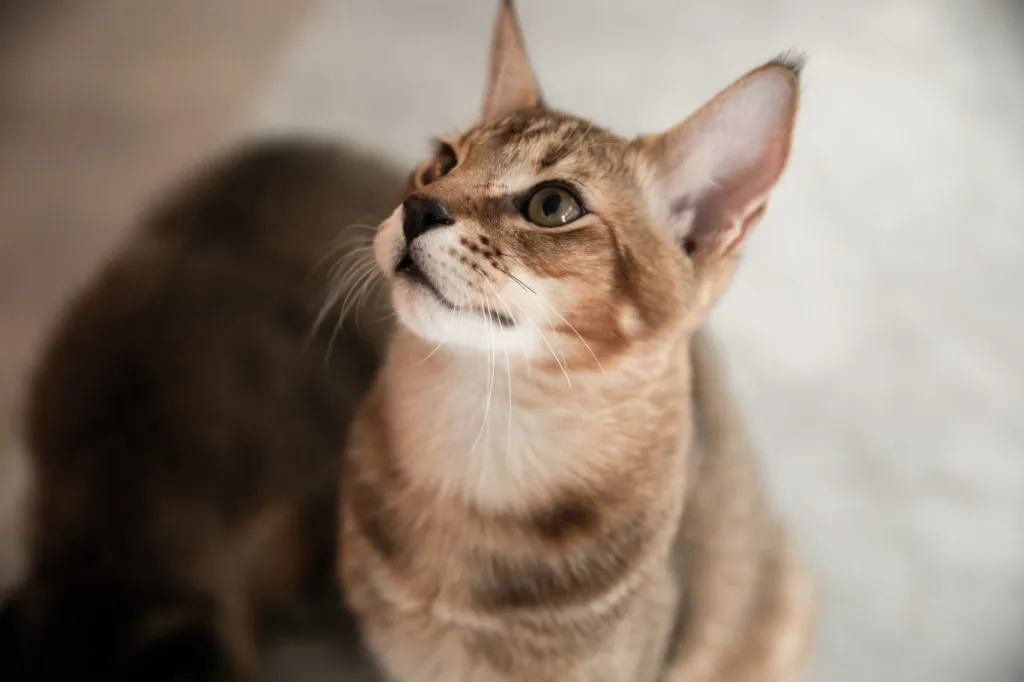
Training and socializing a Chausie is crucial to ensure they become well-behaved and adaptable companions. Chausies are intelligent cats, which makes them highly trainable. Start training them from an early age using positive reinforcement techniques such as treats and praise. This will help them associate good behavior with rewards, making the training process more effective.
Focus on teaching basic commands such as sit, stay, and come. Additionally, you can also engage them in clicker training or agility exercises to stimulate their minds and keep them mentally challenged. Consistency and patience are key when training a Chausie, as they respond best to clear boundaries and routine.
Socialization is equally important for a Chausie's development. Introduce them to various people, pets, and environments at a young age to help them become comfortable in different situations. Expose them to different sounds, sights, and experiences so they learn to adapt and handle new situations with ease.
Provide plenty of opportunities for interaction with other animals through supervised playdates or visits to the park if your Chausie enjoys being around other cats or dogs. However, always monitor their interactions to ensure everyone's safety.
Remember that each cat is unique in terms of their temperament and response to training methods. Be patient, consistent, and understanding throughout the training and socialization process to help your Chausie become a well-rounded member of your family.
Chausies as family pets: Living with other animals and children

Chausies can make wonderful family pets and can get along well with other animals and children when properly socialized and trained. These hybrid cats are known for their friendly and sociable nature, which makes them generally adaptable to living with other pets in the household.
When introducing a Chausie to other animals, it's important to do so gradually and under controlled circumstances. Allow them to interact in a supervised environment, always prioritizing the safety of all animals involved. With positive experiences and consistent training, Chausies can learn to coexist peacefully with dogs, cats, or other small animals.
Chausies also tend to be tolerant of children, especially if they have been raised alongside them from an early age. However, as with any pet, it's essential to teach children how to properly interact with a Chausie by gently handling them and respecting their boundaries. Supervision is crucial during playtime to avoid any accidental roughness or harm.
It's worth noting that individual Chausies may have different temperaments and preferences when it comes to living with other animals or children. Some may be more cautious or reserved, while others may enjoy more active playtime. It's important to observe your Chausie's behavior and adjust interactions accordingly.
By providing a loving and stimulating environment, proper training, and socialization from an early age, Chausies can certainly thrive as family pets alongside other animals and children.
FAQs about Chausies

As a highly unique and intriguing breed, it's natural to have questions about Chausies. Here are some frequently asked questions about Chausies:
- Are Chausies hypoallergenic?
While no cat is completely hypoallergenic, some individuals with allergies may find that they have fewer reactions to Chausies. This is due to their short coat and lower levels of the Fel d 1 protein, which is often the main allergen in cats. - How big do Chausies get?
Chausies are known for their large size. On average, males can weigh between 15-25 pounds, while females tend to be slightly smaller at 10-20 pounds. Their muscular build gives them a sturdy and athletic appearance. - Do Chausies require a lot of exercise?
As an active and energetic breed, Chausies do need regular exercise to keep both their bodies and minds stimulated. They enjoy interactive play sessions and benefit from having access to outdoor spaces where they can climb, run, and explore. - Can I keep a Chausie as an indoor-only pet?
While providing outdoor access can be beneficial for a Chausie's exercise needs, they can adapt to being indoor-only pets if provided with ample mental stimulation and physical activity within the home environment. - Are Chausies prone to any health issues?
In comparison to some other breeds, Chausies are generally healthy cats with minimal breed-specific health concerns. However, like all cats, they may still be susceptible to common feline health issues such as dental disease or obesity if not properly cared for.
Remember that individual cats may have different needs or characteristics depending on their genetics and upbringing. It's always best to consult with a reputable breeder or veterinarian for personalized advice specific to your Chausie.
In conclusion: Is a Chausie the right cat for you?
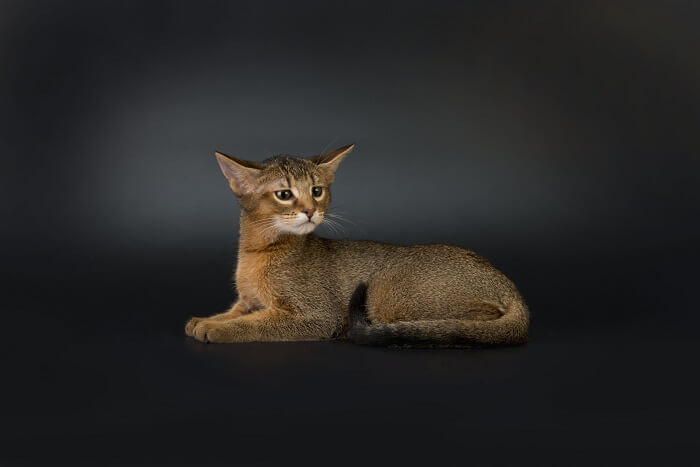
In conclusion, determining whether a Chausie is the right cat for you depends on your individual lifestyle and preferences. Here are some key points to consider before making this decision:
- Active Lifestyle: Chausies thrive in an environment that provides plenty of mental and physical stimulation. If you lead an active lifestyle and can provide regular exercise and playtime, a Chausie may be a good fit.
- Time and Attention: Chausies are intelligent and social cats that require a significant amount of interaction and mental engagement. If you have the time and willingness to provide them with attention, a Chausie can make a loving companion.
- Space: Due to their muscular build and need for activity, Chausies do best in homes with ample space. If you live in a small apartment or lack access to outdoor areas, it might not be ideal for this breed.
- Allergies: Chausies have shorter coats compared to other breeds, which could potentially result in fewer allergic reactions. However, it's important to note that no cat is completely hypoallergenic, so individuals with severe allergies should proceed with caution.
- Commitment: Owning any cat requires a long-term commitment that includes providing proper care, veterinary attention, and love throughout its lifespan. Make sure you are ready for the responsibilities that come with owning a Chausie.
Ultimately, understanding the unique characteristics of the Chausie breed is crucial in determining if it aligns with your lifestyle and preferences as a pet owner. It's recommended to meet and spend time with Chausies before making a final decision or consult with reputable breeders or veterinarians who can provide personalized guidance based on your specific situation.




0 Comments